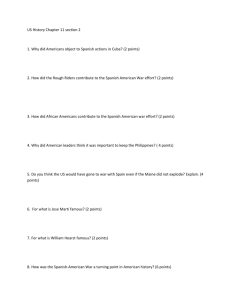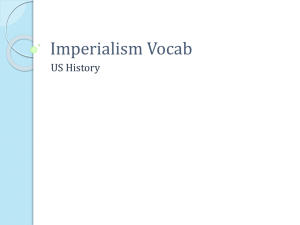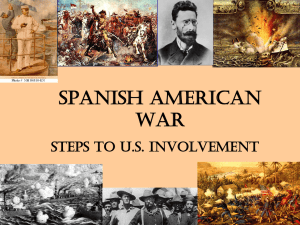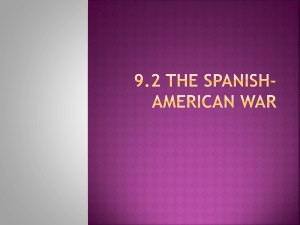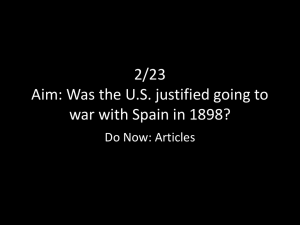American Motivations at the Turn of the Century
advertisement
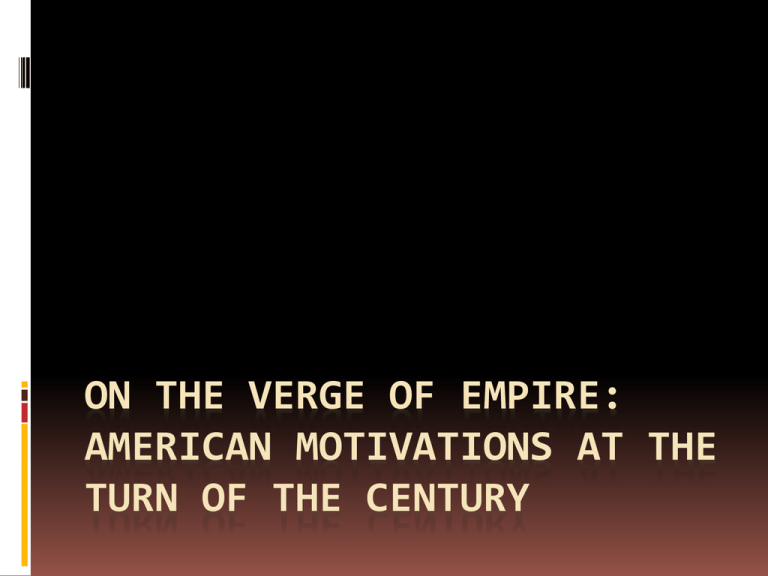
ON THE VERGE OF EMPIRE: AMERICAN MOTIVATIONS AT THE TURN OF THE CENTURY Motivations Overview 1. Economic Expansion 2. Nationalism 3. New Markets Raw Materials Jingoism Militarism Competition Social Darwinism Missionaries White Man’s Burden The Imperial grab-bag, a free-for-all for all world powers. Arguments For Expansion: Economic Overproduction of Goods: American industrialization created more raw materials and manufactured goods than could be sold (supply exceeded demand) Mass consumption evident in chain stores, mail order, and department stores Required new markets to sell goods Labor Rise of Organized Labor: AFL and Knights of Labor forced higher wages and better working conditions Cost of business increased Labor unrest forced businessmen to find other labor sources Other Economic Considerations Federal government increased regulation of business (anti-trust, most notably) Overseas expansion was sound economic policy Recent recessions: Panic of 1893 indicated the need for economic regulation Picture of the Panic of 1893 as it would have affected the New York Stock Exchange. Ideological Arguments Manifest Destiny: Advocated by vocal “Westward Ho” The angel of “progress leading Americans westward. The West, considered the Promised Land, brought millions in search of cheap land. expansionists: F.J. Turner, Theodore Roosevelt, and Henry Cabot Lodge The frontier was quickly vanishing (due, in part, to population boom, agricultural, and industrial expansion) The frontier symbolized the democratic ideal of freedom and self reliance International expansion must replace geographic barriers in North America History of Foreign Policy The White Man’s Burden White Man’s Burden: Advocated by missionaries like Josiah Strong Derived from Rudyard Kipling’s poem intended to help the savages U.S. must spread democracy, Christianity, and civilization throughout the world Brought a sense of paternalism to colonialism “The Cares of a Growing Family.” Paternalism, a condescending approach taken by imperialist countries to the natives, implied that the civilized country should treat other countries like children. Social Darwinism Derived from science, eugenic, and pseudoscienctific (racial) theory All countries, in order to survive, must compete The fittest (militarily, culturally, and economically) country and the one which can adapt, will prevail Eugenics, the 19th century study of racial genetics became the main justification for racial superiority. This, and phrenology, the study of the bumps on a human head, explained group and individual psychology Two Views of Social Darwinism Ideology American Nationalism Advocated in national elections America was destined to be the The power of the American eagle is clearly evident in its wingspan which covers the world. Note, also, that the light from the sun emanates from behind the bird. Incidentally, the national bird was originally proscribed, by Ben Franklin, to be the turkey. most powerful protector of all things good: money to spend, food to eat, human rights, culture, etc America must compete with rival imperial powers: AustriaHungary, Germany, Britain, France, and Russia (all the powers involved in WWI) America has the responsibility to share the right of selfdetermination, democracy, selfgovernment and human rights Strategic Arguments for Expansion Based on Admiral Alfred T. Mahan’s Book, The Power of the Seas Claimed a fully equipped Mahan’s treatise on naval control and supremacy set off the first arms race of the twentieth century. The race to mobilize a steel navy and develop new naval technology was first accomplished by the Germans, then the British in Europe. The Germans were the first to develop the submarine modern navy would ensure domestic tranquility, economic control, and world peace Becoming a superpower depended on a modern navy Strategic Militarism Arms Race Control of the seas depended on rapid buildup and construction of a steel navy Control of the seas depended on the rapid deployment of the navy across oceans German superiority in submarine technology resulted in their control of the Atlantic prior to the Great War Control of foreign ports American shipbuilding was a slow process, with shipyards primarily in the East Coast. It would often take over 240 days to construct and fit a naval ship. By World War II, Henry Kaiser cut the time it took to 22 days Including the Hawaiian port of Pearl Harbor, the control of islands provided fuel, strategic protection, and a rest stop In Short The imperialist agenda won out Character of agenda depended on presidency and key leadership Arguments in favor of imperialism outweighed arguments against imperialism All superpowers, throughout history, have succeeded on a balanced imperialist policy All superpowers, throughout history, have failed if their policy overextended their ability and resources We have a foundation NOW FOR THE STORY Hawaii Hawaii becomes a US protectorate in 1849 due to economic interests American businessmen invested in Hawaiian plantations American govt. saw Hawaii as a strategic local Hawaiians seen as inferior Hawaii: A rebellion American farmers revolted against Queen Liliuokalani American marines support rebellion Establish “Committee of Safety” to “protect” the workers Queen sought to regain more control of the islands Queen ousted and a new constitution was drafted Grover Cleveland opposed annexation but congress voted to go ahead in 1898 Cuba Cuba, Spain’s last prized possession 1868- 10 years of rebellion against the Spain ends in failure US ignores pleas for help 1895– Maximo Gomez and Jose Marti Gomez lead another rebellion against Spain Spain reacts 1896 Reconcentration policy– General Valeriano (Butcher) Wyler 8 Days to move to fortified towns Disease, starvation, etc Shot if failed to obey Burning and destruction of Cuba’s infrastructure by both rebels and Spanish Yellow Journalism William Randolph Hearst and Joseph Pulitzer Yellow Journalism-- Publications exaggerate the atrocities to gain American Support for intervention. Hearst is said to have told his photographer who was about to return home from an uneventful trip to Cuba, “Please remain. You furnish the pictures and I’ll furnish the war.” Yellow Press Yellow Journalism Nickname came from the newly created colored comics that left many of the newspapers covered in yellow ink Immediately pointed to the Spanish as the perpetrators of the explosion even though they had no motive or evidence McKinley immediately jumped on the bandwagon De Lome Letter Spanish ambassador to America sends letter to Spanish friend in Cuba Cuban rebels intercept the letter and expose the contents Hearst published it in his paper The letter states: “McKinley is weak and catering to the rabble and, besides, a low politician who desires to leave a door open to himself and to stand well with the jingos of his party." Remember the Maine!!! Spanish Reaction Spanish, wanting nothing to do with a war and quickly removed the accused officials from the country Also offered Cubans autonomy but this fell way short of establishing Cuba as independent. US Reaction President McKinley wanted an investigation prior to war Hearst’s paper incited anger toward the Spanish with definitive accusations . War!!! April 19th 1898, after McKinley’s request, congress declared Cuba free and independent, demanded Spanish leave and gave the military permission to take action to help liberate Cubans. “Any Means Necessary” Spanish declare war on US McKinley Asks for Support McKinley gets $50 million approval from congress Only 26000 troops Congress increased to 62000 and 125000 volunteers added Ill equipped with civil war arms and supplies Wool uniforms, civil war rifles, etc. Transporting of troops was difficult Backfiring of Racism and Yellow Journalism Most news had led Americans to believe that the Cubans were civilized, well trained and intelligent light-skinned people and the Spaniards as barbaric dark-skinned savages Reality=Opposite (in the eyes of the soldiers) Racism prevented the American military from taking advantage of what was truly a well trained Cuban population. They Refused to fight along side because of the racism brought about by Social Darwinists and Racist Ideals in America. Dewey’s Victory Late April- Dewey, while visiting Hong Kong, Gets word of war and turns fleet toward Manila (Philippines) Paints Ships Grey (were white) and destroys all wood cargo (notorious for splintering and killing sailors) A Sailor on the Boston Wrote Just two hours after the beginning of the battle we hauled out and, withdrawing a few miles, the order was given for breakfast. I was exhausted from the heat, loss of sleep, and lack of proper food. I went up on deck. Below the thermometer was at 116°, and the fresh air was a great relief. From this vantage point, I could see the destruction we had wrought. Total American Casualties Rough Riders Army lacked organization Some groups outfitted themselves Theodore Roosevelt and Leonard Wood gathered a group of primarily cowboys, ivy league gentleman, native Americans, prospectors, and some Latin Americans and began organizing while in Tampa, Fl. We drew recruits from Harvard, Yale, Princeton, and many another college; from clubs like the Somerset, of Boston, and Knickerbocker, of New York Rough Riders Now or Never Environment was taking the biggest toll on the soldiers Roosevelt- Armed with a pistol and a saber, ordered the charge up the hill. The 9th and 10th Cavalry Several regiments of blacks showed extreme bravery in battle. “If it had not been for the Negro cavalry, the Rough Riders would have been exterminated” I am a Southerner by birth, and I never thought much of the colored man. But…I never saw such fighting as those Tenth Cavalry men did . They didn’t seem to know what fear was.” Even pro-imperialist and supporter of social Darwinist ideas Theodore Roosevelt stated that the black troops were, “an excellent breed of Yankee.” Kettle Hill and San Juan Hill 1st stop—Kettle Hill was taken by the Rough Riders 2nd stop--Roosevelt rode to the top of San Juan Hill to find that it had already been taken by the 10th African American regiment. Atop the High Ground Spanish Naval Defeat Just as the Americans began loosing moral ground, the Spanish fleet tried to retreat from Santiago Harbor but were crushed by the American Fleet. Meanwhile, half-way around the world… US, even though the Filipinos had fought with us against Spain, took over the Philippines by force Filipinos fought back but were placed in concentration camps just like the Spanish used in Cuba More casualties fighting in the Philippines than against Spain Anti-Imperialist Leagues Andrew Carnegie, Mark Twain, Grover Cleveland, Benjamine Harrison, Samual Gompers, Jane Addams, William James Annexing without plan for statehood was unconstitutional Occupation without consent violated Declaration of Independence Reforms at home needed attention Too costly Fighting Filipinos reflected American Hypocracy Economic Federal government didn’t have the money Would require private contracts which would further corrupt government Too much labor unrest, urban poverty, agricultural depression, and unemployment required focus on domestic spending Uncle Sam, ever the symbol of American virtue (and vice) is here seen as a nonchalant guardian of the world. His posture is unworried and his expression, unconcerned. Ideological Arguments Imperialism fundamentally opposed to American ideals of selfgovernment, selfdetermination, and democracy “Manifest Destiny” was an excuse for greed and gaining profit “White Man’s Burden” was inherently patronizing and racist Politics The government had failed to ensure the right of democracy to African-Americans, Mexican-Americans, most immigrant groups, the poor, and all women A Comparative Look: Arguments For Expansion Cheap resources and new markets Manifest Destiny Social Darwinism Required ports Logical extension of U.S. A Summary Arguments Against Expansion Expensive Difficult to maintain Anti-Democratic Racist Patronizing Reactions "I have been criticized a good deal about the Philippines," McKinley said, "but I don't deserve it. The truth is . . . they came to us as a gift from the gods." "Congratulations," Andrew Carnegie wrote to a leading expansionist. "You seem to have about finished your work of civilizing the Filipinos. It is thought that about eight thousand of them have been completely civilized and sent to heaven. I hope you like it." Treaty of Paris December 10th, 1898 Spain reliquishes control of Cuba Spain cedes Puerto Rico, Guam, Marianas and Philippines to the United States exchange for 20 Million) (in American-Filipino War Statistics 15000 Filipino Soldiers Died Fighting 4200 American died fighting Cost America 160 million (8X what we had paid for the islands to begin with) Estimated 50,000 to 200,000 Filipinos died indirectly (starvation, disease, fighting) Cuba Cuba, “a protectorate” Interventions in political affairs Trade with Cuba increased tenfold (27 to 300 million) Americas investment in Cuba quadrupled Our political, economic and military control of Cuba fueled Cuban resentment for years to come Puerto Rico The Foraker Act (1900) – Made Puerto Rico a territory but did not grant the inhabitants US citizenship. The act gave America the exclusive right to establish whatever government they saw fit. Spain had allowed Puerto Ricans some independence Public Opinion Cuba and Puerto Rico are Different American public did not protest the control exerted over the islands in the west. Because of the Monroe Doctrine (1823) Americans believed that we had the right to protect our interests in the Western Hemisphere and to prevent the Europeans’ influence in the west Interpret China: Background China took an isolative stance upon arrival of western powers Western powers found ways of getting into China– Opium and then force Many in China responded by trying harder to slam the door shut Eventually western powers gained access to China America’s Reaction Brittan, Russia, France, Japan and Germany were exerting their influence in China America did not want the Europeans to gain complete control over China The Cracked Door John Hay asked the Europeans to open the doors to world trade Europeans– We might consider it if they (other euro countries) consider Hay acted as if they had given the thumbs up. When Chinese rebels laid siege to Beijing, the US sent troops to help end the “Boxer Rebellion” We used our influence during this event to gain a foothold in China. We also made it seem, once again, that we were the saviors or the Chinese US offers China an alternative Japan: If you can’t beat them…
